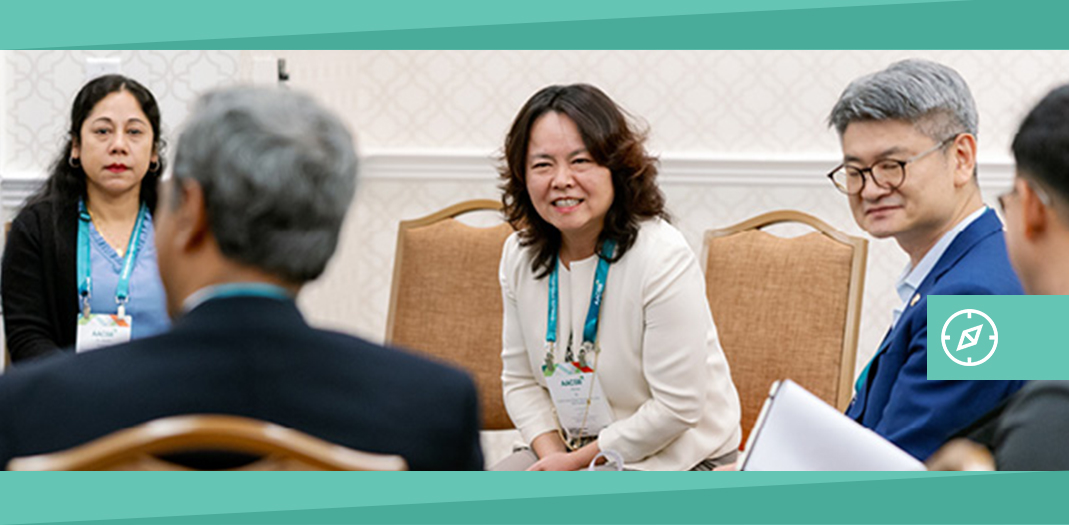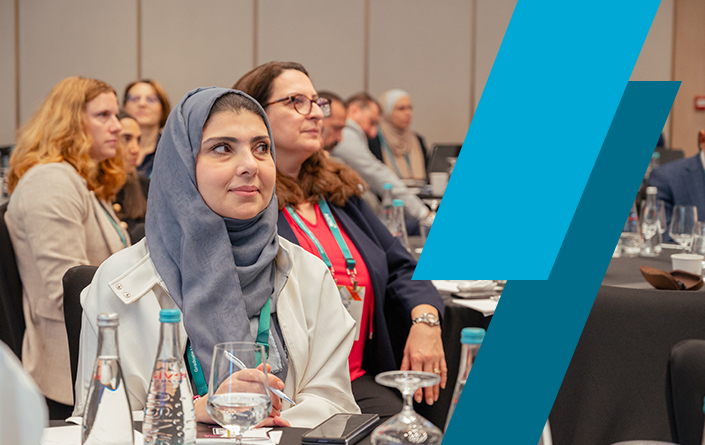Optimism for the Future
- The social contract of the workplace is shifting. To be relevant, it requires new models, leadership, and skill sets.
- Technologies such as data analytics and artificial intelligence will not make humans obsolete. Rather, employees will meet organizational objectives by combining their unique skill sets with technology.
- Organizational leaders are in control of creating a bright future and must work alongside business schools so that tomorrow’s leaders are exposed to the learning, mindsets, and values needed for success.
A breath of optimism was offered to attendees at AACSB’s 2022 International Conference and Annual Meeting (ICAM) by keynote speakers Kate O’Neill and Simon Sinek. The first ICAM to convene in person since 2019, this year’s event was held in New Orleans, Louisiana, and chaired by Jikyeong Kang, president and dean of the Asian Institute of Management and chair of the AACSB Board of Directors.
Kate O'Neill is known as the tech humanist. She is the founder of KO Insights, a firm committed to improving the human experience at scale, even in data-driven, algorithmically optimized AI-led interactions. O’Neill is the author of five books, including A Future So Bright. In 2020, she was named to the Thinkers 50 Radar, a global ranking of top management thinkers.
Simon Sinek considers himself an incurable optimist. He imagines a world in which most people start their days inspired to work and end their days feeling fulfilled by their contributions. Sinek is the author of multiple bestselling books, including Start with Why, Leaders Eat Last, Together is Better, and The Infinite Game.
Together, they shared ways that business schools can address the demands of our changing world.
Rethinking the Social Contract of the Workplace
Sinek envisions a future where the workplace is a safe place for employees to freely express concerns or uncertainty—whether about the organization or their own capabilities—without fear of hurting their potential for promotion. But today, many organizations have lost their sense of “humanity in business,” a loss that is especially reflected in corporate culture. Sinek explored the changing employer-employee dynamic, particularly around the lack of loyalty that once was considered sacred. He posits it is not that the new generation does not know how to be loyal; rather, for too many decades, loyalty has not been reciprocated at the workplace.
When asked why employees do not take their concerns to managers, Sinek said, “I think the answer is simple, [employees] don't trust them.” The lack of trust in leadership is symptomatic of a much larger issue in which employees do not feel they can speak up in the workplace. When there is a lack of trust in the workplace, it manifests as office politics and gossip, because employees feel that their interests are not represented. Employees spend their time compensating and covering up for their shortcomings, which leads to a disengaged workforce and poor performance.
Replacing judgment with curiosity does not indicate agreement but encourages progress.
Addressing this issue begins with business schools and how they prepare future business leaders. Sinek continued, “You’re producing the leaders that will build the companies for the future. These are the young executives who are going to look at their current executives and ask, ‘Where are the ethics in that decision?’ ‘Where's the purpose in that decision?’”
Another key skill that must be prioritized in business schools is listening. Everyone has become adept at arguing their points, but most people place little stock in trying to understand the issue or counter argument. “We're all very good at demonizing the other side and explaining that they’re wrong,” stated Sinek. He shared that “listening to understand” is the only way to convince people on the opposing side to let down their guard to reciprocate. Replacing judgment with curiosity does not indicate agreement but encourages progress. He concluded that either side can go first to do the listening. “So why not us?”
Developing Human Skills in a Technologically Enabled World
O’Neill’s presentation also looked at workplace dynamics, particularly through a technological lens. O'Neill remarked that the physical and digital worlds have already been connected through a swath of timestamps left by users’ devices across the globe. Smart devices, such as thermostats and mobile phones, are leaving a trail of timestamps that, when leveraged, can be used to build a better human experience.
In an increasingly complex and integrated environment, effective leaders will need to be adept at working around seemingly opposing ideas and identifying where the truth, or nuances of truth, exist. She referred to this skill as “both-and thinking.” As humans continue to work more closely with machines that lack this ability, both-and thinking will be important for business schools to prioritize in their development of future business leaders.
Business schools must do their part in helping learners lean into humanity's capacity to seek meaning in the work they do.
O’Neill discussed the idea that, as machine learning advances, employees will naturally have concerns about their place in the workplace of the future; however, human workers will still be able to contribute because they are able to seek and find meaning. “Meaning-making and meaning-seeking are some of the most fundamental human characteristics,” she said, and these are abilities that machines cannot replicate (yet). Business schools can help students harness their human skills in the context of technology by teaching them to identify the nuances and commonalities across opposing or complex concepts that can allow for innovation to happen.
The importance of human-centric skills becomes amplified as the world increasingly faces polarization and the need for uncovering “multiple truths.” It is imperative for leaders to employ "both-and" thinking, and business schools must do their part in helping learners lean into humanity's capacity to seek meaning in the work they do.
For companies to be relevant to today’s societal and business needs, corporate culture and business models require course correction. What worked in the 1980s and 1990s is no longer effective today, and business schools play an important role in molding tomorrow’s leaders who can fundamentally change the way businesses operate. This shift will require faculty who can provide timely and engaging learning experiences to learners across flexible delivery methods, as well as a balanced focus on the development of hard and human skills.
Having a generation of students and faculty understand their core purposes, values, and beliefs in this world will invariably produce a happier and more engaged workforce. Sinek emphasized that business schools can concentrate on teaching learners to cooperate and take care of one another. O’Neill echoed this and called for businesses and business schools to center on a common purpose. She suggested they can use that purpose as the focal point to bring all functions around the organization into alignment.
AACSB further explores the future of business education—including how business schools can leverage digital transformation successfully—in its new report, Five Forces Driving the Future of Business Education.





